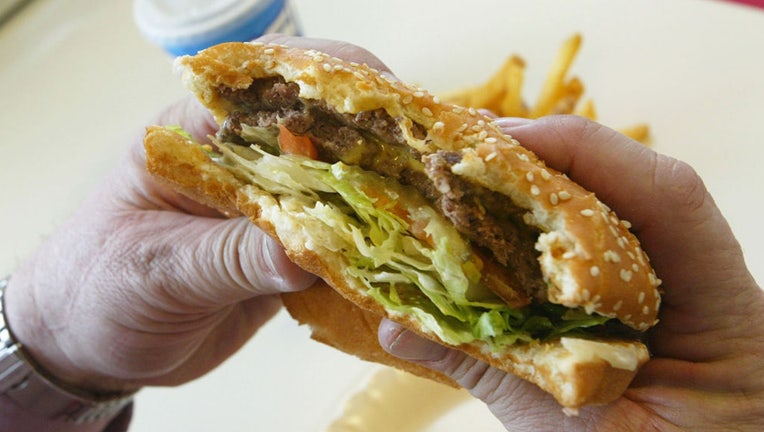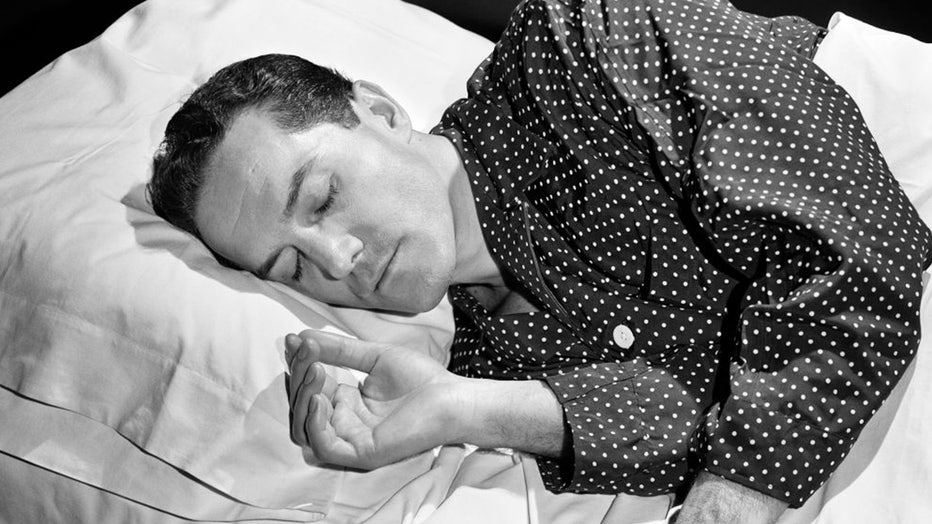Eating junk food may hinder deep sleep, study says

FILE - Man bites into a double cheeseburger. (Justin Sullivan/Getty Images)
Researchers in Sweden found there may be a link between eating junk food and poor deep sleep.
In a recent study published in the journal Obesity, healthy participants consumed an unhealthy, as well as a healthier, diet in a randomized order.
Researchers from Uppsala University found that the quality of participants’ deep sleep had deteriorated after eating an unhealthy diet, compared to eating a healthier diet.
"Both poor diet and poor sleep increase the risk of several public health conditions. As what we eat is so important for our health, we thought it would be interesting to investigate whether some of the health effects of different diets could involve changes to our sleep," Jonathan Cedernaes, physician and associate professor in Medical Cell Biology at Uppsala University, said.
Controlled diets
A total of 15 healthy young men participated in the study, which researchers note is a small number of people but this was necessary because participants had to be monitored for several days in a sleep laboratory.
The healthier diets that were given to participants consisted of the same number of calories, adjusted to each individual’s daily requirements.
The unhealthy diets contained higher amounts of sugar and saturated fat and more processed food items.
Participants consumed a randomized diet consistently for a week but their sleep schedules were monitored individually.
Sleep schedules

FILE - Man sleeps peacefully on his side. (Richter/ClassicStock/Getty Images)
All participants were deemed to have normal sleeping habits which averaged between seven to nine hours of sleep per night prior to the experiment, according to the study.
During the first night of monitored sleep, participants were allowed to adhere to their regular sleep schedule. Afterward, participants were then forced to stay awake in the sleep laboratory before they were eventually allowed to catch up on sleep.
"What we saw was that the participants slept for the same amount of time when they consumed the two diets. This was the case both while they were following the diets, as well as after they had switched to another, identical diet. In addition, across the two diets, the participants spent the same amount of time in the different sleep stages. But we were particularly interested in investigating the properties of their deep sleep. Specifically, we looked at slow-wave activity, a measure that can reflect how restorative deep sleep is," Cedernaes explained.
"Intriguingly, we saw that deep sleep exhibited less slow-wave activity when the participants had eaten junk food, compared with consumption of healthier food. This effect also lasted into a second night, once we had switched the participants to an identical diet. Essentially, the unhealthy diet resulted in shallower deep sleep. Of note, similar changes in sleep occur with aging and in conditions such as insomnia. It can be hypothesized, from a sleep perspective, that greater importance should potentially be attached to diet in such conditions," Cedernaes continued.
What’s next
While further studies on the connection between poor diet and deep sleep are warranted, Cedernaes said the next big step is to see whether other health issues such as deteriorating memory function could be impacted due to prolonged sleep issues caused by eating an unhealthy diet.
"It would be equally interesting to understand how long-lasting the observed effects may be. Currently, we do not know which substances in the unhealthier diet worsened the depth of deep sleep. As in our case, unhealthy diets often contain both higher proportions of saturated fat and sugar and a lower proportion of dietary fiber. It would be interesting to investigate whether there is a particular molecular factor that plays a greater role. Our dietary intervention was also quite short, and both the sugar and fat content could have been higher. It is possible that an even unhealthier diet would have had more pronounced effects on sleep," he said.
This story was reported from Los Angeles.

